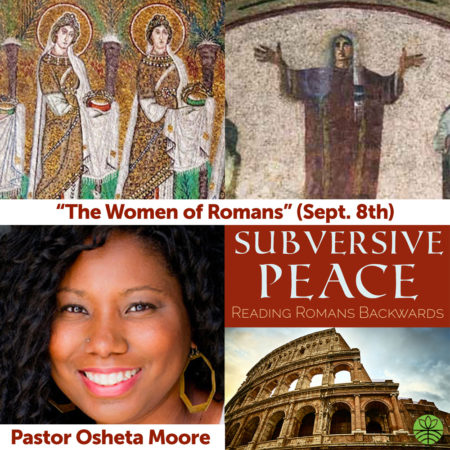Subversive Peace: Reading Romans Backwards (Page 2)
Privilege Displaced
Romans chapter 9 has been misunderstood as a passage about individual election, predestination, and personal salvation. But Romans is not a book of abstract, systematic theology. Romans is a pastoral letter written to a church with factions along cultural and ethnic lines. Paul is writing to the so-called “Weak” and “Strong” to reframe the stories they’ve been living in. Privilege was an key part of what was driving these groups apart, dividing the Body of Christ. Today in the U.S.,…
From Zeal to Hospitality
Romans 13 is a famous text that has been used as a proof-text to justify state-sponsored violence for millennia. By reading Romans “backwards” (in light of the conflict between the factions in the house churches of Rome), we can more clearly see Paul’s purpose for writing this passage. Rather than sanctioning state-sponsored violence, Paul was transforming the zeal of the so-called “Weak” into love, honor, and hospitality. Paul was also reminding the disciples in Rome of Jesus’s teachings of enemy-love…
Christoformity, Glory, Hope
These three words, Christoformity, Glory, and Hope, represent the basic arch of Paul’s theological conviction for a unified multiethnic family of Jesus followers. Through what Scott McKnight calls “Christoformity” or the process of becoming like Christ in self-sacrificing ways, the Weak and the Strong – Jews and Gentiles–bring Glory to God when they give up their privileges and preferences for unity with the other. And because of this newly unified family of Jews and Gentiles, God will be glorified and…
The Household of Christ
In chapters 14 and 15, the apostle Paul/Saul directly addresses the conflict between factions in the house churches of Rome. Namely, he points out that there is division among them along cultural and ethnic lines after the Jewish disciples who were expelled from Rome begin returning only to find a gentile-dominated church that no longer feels like home. The factions, which Beverly Roberts Gaventa lovingly refers to as the “lettuce-eaters” and the “garbage-bellies,” are deriving their identities from sources other…
Women of Romans
In this message, Pastor Osheta continues our exploration of the house churches of Rome from Romans chapter 16 with a deeper dive into some important female leaders, three of whom are Phoebe, Priscilla, and Junia.



